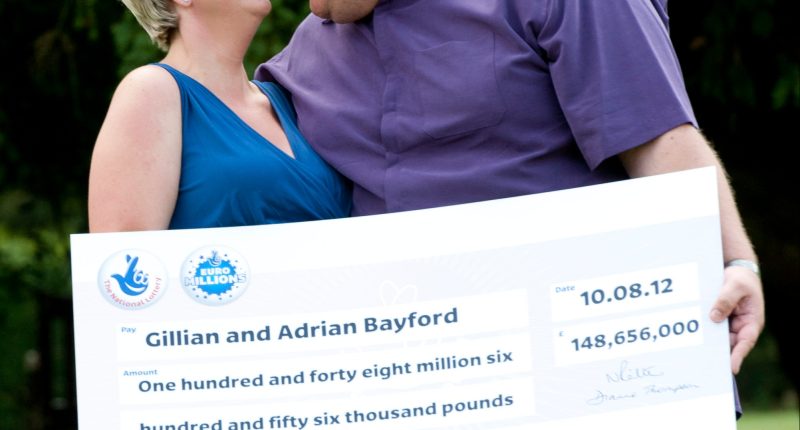THE National Lottery has the power to change lives of ordinary Brits forever – but is also a regular target for cruel scammers.
Nearly 7,000 new millionaires have been created since the first draw back on November 19, 1994 – an average of seven every week.
Landing the huge jackpot prizes is not always a guarantee of happiness, though.
And the National Lottery’s lucky winners are often targeted by conmen – or impersonated as part of attempts to scam other players.
Gillian and Adrian Bayford fraudsters
Adrian and then wife Gillian Bayford won £148million in the EuroMillions lottery in 2012.
Postman Adrian, 53, split from his partner the following year because of the stress of the win.
Read more money
Fraudsters posed as the couple, without their knowledge, to con vulnerable victims out of cash, it was revealed earlier this year.
Targets were promised a £6.5m share of the mega-rich pair’s fortune in the sick con.
One victim Glen Seeber, 67, received an email supposedly from Adrian claiming he’d won a megabucks prize from the pair.
The dodgy message, sent from a Russian address, said: “My wife and I won the biggest EuroMillions lottery prize of 148 Million GBP.
Most read in Money
“We just commenced our Charity Donation and we will be giving out a cash donation of 6,500,000.00 GBP to 5 lucky individuals and 10 charity organizations from any part of the world.”
Suspicious Mr Seeber Googled the couple, found out they’d split — and then took to Facebook to warn others not to be duped into revealing their personal information.
Adrian was pictured with his new girlfriend for the first time in August as they shopped at a Tesco.
The Tesco scammer
A Tesco Express shop worker was jailed for two-and-a-half years in August 2012 after his attempts to falsely claim a winning ticket.
Farrakh Nizzar, 30, who went by the nickname ‘Lucky’, tried to trick an elderly couple out of £1m.
He told winning couple Fred and Maureen Holt their winning ticket was actually worthless.
Instead, Nizzar scanned the ticket at his cousin’s Best One shop in Oldham and phoned a lottery hotline to claim he was the one who purchased the ticket.
But lottery operator Camelot became suspicious after running security checks and flagged the case to police.
He later pleaded guilty to a single count of fraud by false representation and was jailed for 30 months at Minshull Street Crown Court in Manchester.
Nigerian conman ‘Fizzy’
Frank Onyeachonam, 49, stole nearly £5million during a campaign of elaborate scamming in which he targeted pensioners.
Nicknamed ‘Fizzy’ due to a love of champagne, he scammed hundreds of innocent people by leading them to believe they had won the Australian lottery.
He sent professional-looking letters to victims claiming they had won large sums, before demanding “activation fees” to release the money.
Onyeachonam was found guilty of conspiracy to defraud following an OId Bailey trial in 2014 and was jailed for eight years.
As of February, he had failed to pay back any of the money he stole, MailOnline reported.
Shopkeeper’s lie
Imran Pervais escaped a jail sentence when he lied to a customer over the amount they had won.
Calum Crosier was misled into thinking his winning ticket had returned him just £10, when he had actually won more than £79,000.
The victim later realised his ticket had five matching numbers, along with the bonus ball.
Pervais, of Gravesend, Kent, was ordered to carry out 200 hours of community work and handed a 12-month jail term, suspended for two years.
Fraudster’s forged ticket
Edward Putman used a fake National Lottery to claim a £2.5m jackpot in 2009.
He conspired with Lottery insider Giles Knibbs, who worked in Camelot’s security department, to present a fake ticket.
The actual winning ticket, which was never claimed, was bought at a Co-op store in Worcester on March 11, 2009. It had the winning numbers 6, 9, 20, 21 and 34.
But just before the 180-day claim deadline, Putman called Camelot to say he’d found the winning ticket under the seat of his van.
It was missing its bottom part, which contained unique numbers.
However, Camelot accepted the forgery as genuine – even though it was missing a barcode.
The fraud began to unravel on October 5, 2015, when Mr Knibbs, 38, committed suicide at Ivinghoe Beacon in Bucks.
Read More on The Sun
He had confessed to friends that he and Putman had “conned” the Lottery.
Putman was sentenced to nine years’ imprisonment in October 2019.













